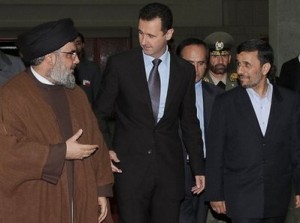 Syria on Wednesday criticized the United States’ renewal of sanctions against Damascus and warned that the penalties reinforce hostilities in the region.
Syria on Wednesday criticized the United States’ renewal of sanctions against Damascus and warned that the penalties reinforce hostilities in the region.
The U.S. renewed the six-year-old economic and diplomatic sanctions Monday, saying Syria has made some progress containing terror networks that Washington says use the country to infiltrate Iraq but that Damascus continues to support terrorists and pursue weapons of mass destruction.
The Obama administration has reached out to Syria, trying to pry it away from the influence of Iran and encouraging it to end its support for Lebanese and Palestinian militant groups.
Deputy Foreign Minister Faysal Mekdad said the sanctions decision shows Washington “has lost its credibility” and failed to live up to its promises to Syria.
Mekdad acknowledged that privately the tone from Washington was more positive.
“What is being heard publicly from the Americans is exaggerated and what is happening behind closed doors is the exact opposite,” he told the Al-Watan daily.
The Al-Thawra newspaper, considered a government mouthpiece, called the sanctions “a disappointment” but added that Damascus was not surprised. It warned that the U.S. decision “would keep the region in a state of antagonism and wars.”
Obama’s predecessor, former President George W. Bush, first imposed the sanctions in May 2004, accusing Syria of supporting terrorism, pursuing weapons of mass destruction and undermining U.S. operations in Iraq.
The recent U.S. outreach has included high-level diplomatic contacts with Damascus and a decision to send an ambassador to Syria after a five-year absence.
But the ties suffered a setback after Israel accused Syria last month of sending Scud missiles to Lebanon’s Hezbollah militants. Syria denies sending any weaponry to Hezbollah. The Shiite militant group and Lebanese government officials have also rejected the accusation.
Addressing the Israeli claim, the U.S. said last month that it was increasingly concerned about what it described as the transfer of more sophisticated weaponry to Hezbollah.
On Wednesday, the commander of the U.N. peacekeeping force in southern Lebanon told the An-Nahar newspaper his forces had no evidence that Scud missiles had been sent to Hezbollah.
Maj. Gen. Alberto Asarta Cuevas told the Lebanese newspaper it would be difficult to hide such large weapons systems from the 12,000 peacekeepers and three Lebanese army brigades that patrol the area near the border with Israel.
Hezbollah says it has rockets and missiles capable of reaching anywhere in Israel, but the group is not believed to keep its longer range missiles in the U.N. force’s area of operations, where the international patrols closely watch for suspicious activity. AP

Leave a Reply
You must be logged in to post a comment.